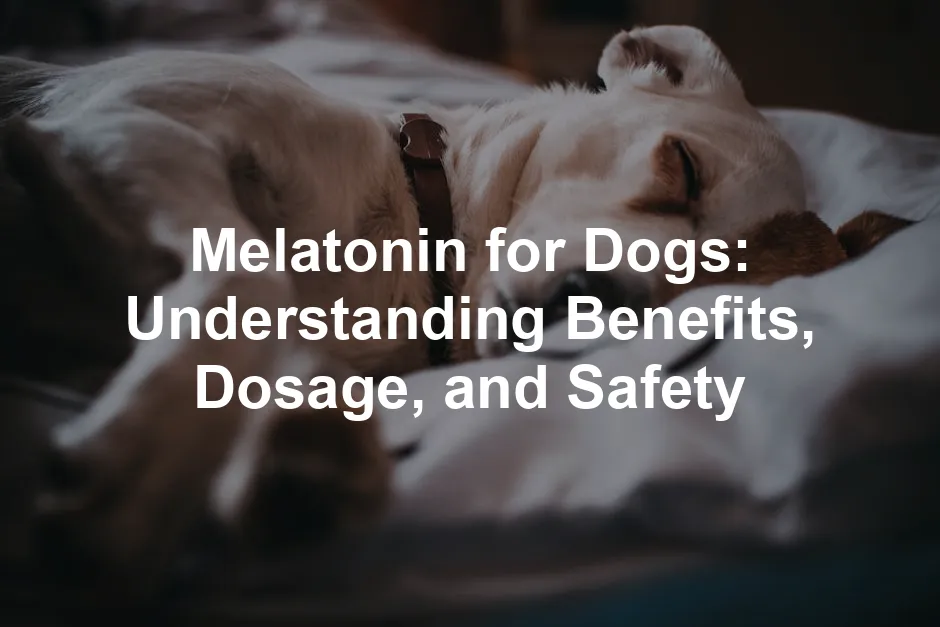Introduction
Have you ever struggled to get a good night’s sleep? Many humans turn to melatonin for help. This hormone helps regulate our sleep patterns. Recently, pet owners have become interested in melatonin for dogs. It offers potential benefits, including anxiety relief and improved sleep.
However, before jumping in, it’s crucial to consult your veterinarian. Proper dosage is key to ensuring safety and effectiveness. Let’s dive deeper into the benefits of melatonin for dogs and why professional guidance is essential.

Summary and Overview
Melatonin is a hormone produced by the pineal gland. It regulates sleep-wake cycles, helping both humans and dogs get restful sleep. For dogs, melatonin can provide several benefits. It may reduce anxiety, act as a sleep aid, and even assist in treating certain conditions like alopecia.
It’s important to note that melatonin is not FDA-approved for dogs. Because of this, veterinary guidance is vital to ensure safe use. In this article, we will cover the following sections: what melatonin is, its benefits for dogs, safety considerations, and dosage guidelines.

What is Melatonin?
Melatonin is a neurohormone secreted by the pineal gland in response to darkness. Its primary function is to regulate circadian rhythms, signaling when it’s time to sleep and when to wake. This hormone plays a crucial role in maintaining a healthy sleep cycle, not just for humans but for dogs as well.
As daylight fades, melatonin levels rise, promoting feelings of sleepiness. In dogs, melatonin can help manage sleep-related issues and anxiety, making it a popular supplement among pet owners. However, before starting any melatonin regimen for your dog, it’s essential to consult your veterinarian for personalized advice.

Benefits of Melatonin for Dogs
Key Benefits
Melatonin is gaining popularity among dog owners for its various benefits. It can help your furry friend in several ways.
Anxiety and Stress Relief
Does your dog panic during thunderstorms or fireworks? Melatonin can calm anxious pets. It’s effective for separation anxiety too. Administer it an hour before the stressful event for the best results. Many dog owners report a noticeable reduction in anxiety.
For an added layer of comfort, consider pairing melatonin with a Dog Anxiety Vest. This snug garment can provide your pet with a sense of security during stressful situations, helping to calm their nerves even more effectively than melatonin alone!
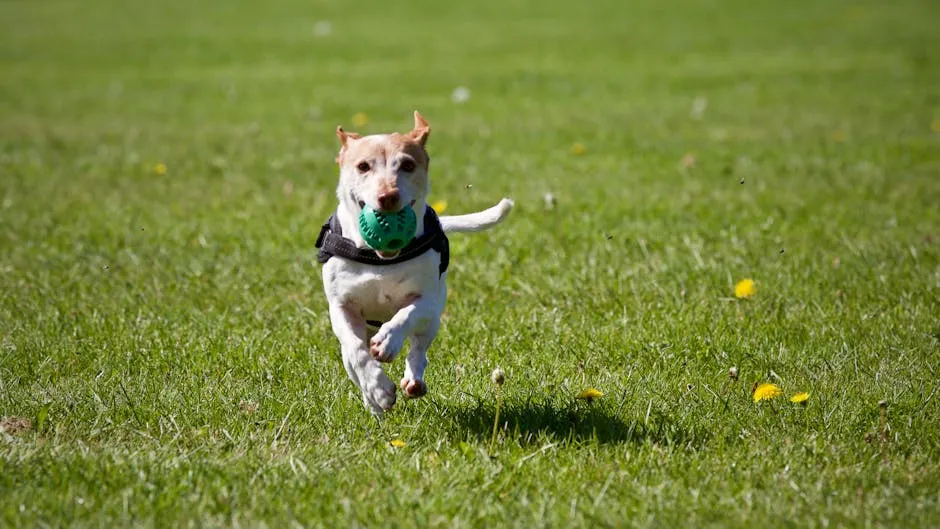
Sleep Disorders
Sleep issues are common in dogs, especially older ones. Melatonin helps regulate their sleep-wake cycles. It can assist dogs who struggle with insomnia or night pacing. Giving melatonin about 30 minutes before bedtime may help your dog sleep soundly through the night.
Alopecia
Melatonin might also aid in treating alopecia. This condition leads to hair loss in dogs. It helps regulate hormones related to hair growth. Many owners have seen improvements in their dog’s coat after consistent use.
Cognitive Function
Older dogs sometimes suffer from cognitive dysfunction. Melatonin may help alleviate symptoms related to this condition. It can improve sleep patterns and overall mental clarity. If your dog seems confused or disoriented, melatonin could be beneficial.
In summary, melatonin offers stress relief, helps with sleep disorders, treats alopecia, and supports cognitive function. Consider monitoring your dog’s behavior closely after starting melatonin to see how it affects them.
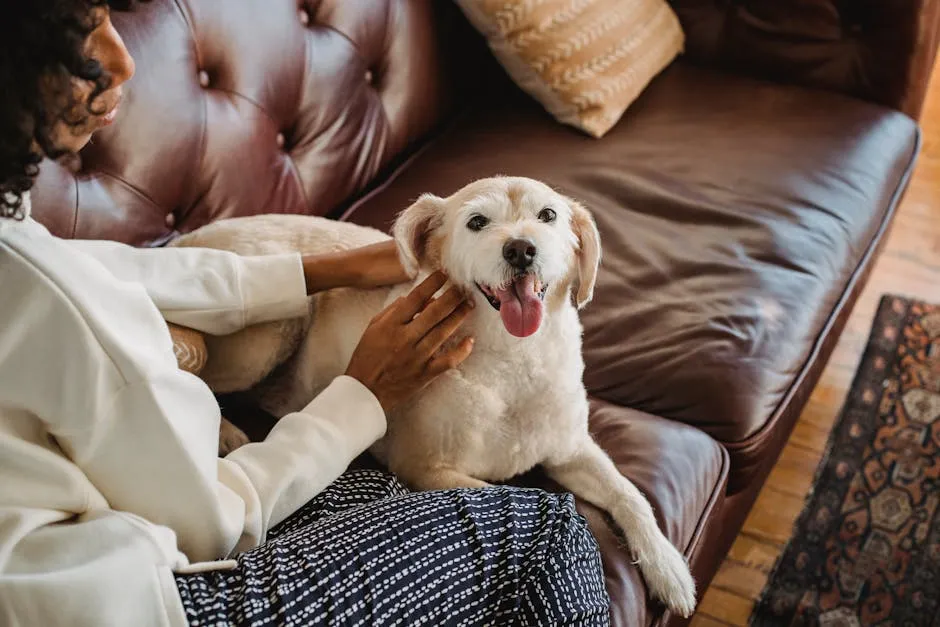
Safety and Considerations
Is Melatonin Safe for Dogs?
Many pet owners wonder about the safety of melatonin for dogs. Generally, it is safe when given in proper doses. However, consulting with your veterinarian is crucial. They can provide personalized advice tailored to your dog’s specific needs.
Be aware of potential side effects, which are usually mild. Some dogs may experience drowsiness, upset stomach, or increased heart rate. If your dog has allergies or is pregnant, avoid melatonin unless directed by your vet. Always prioritize safety and proper consultation to ensure your pet’s well-being.
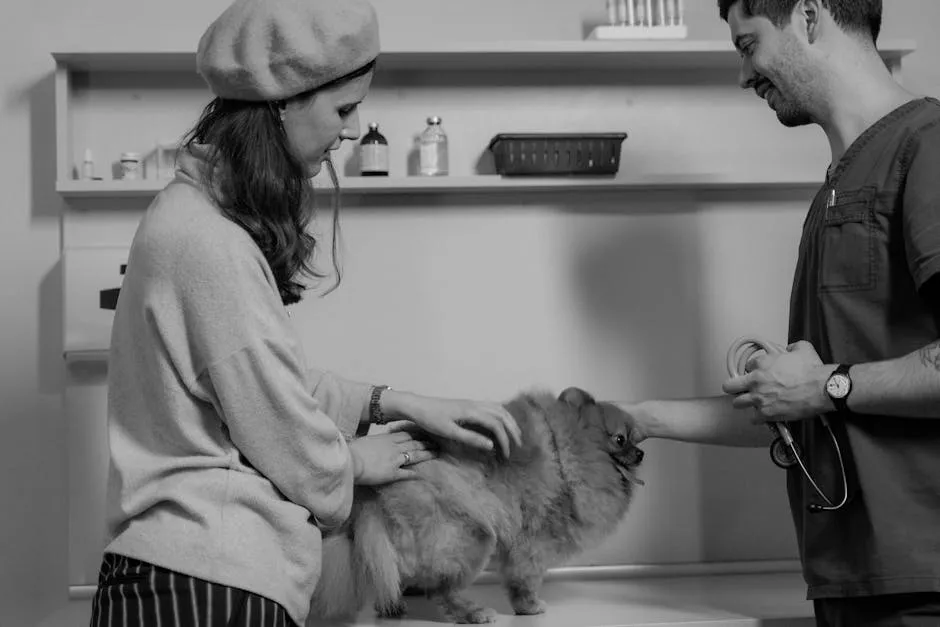
Melatonin Dosage for Dogs
Dosage Guidelines
Determining the correct melatonin dosage for your dog is crucial. Dosage varies based on your dog’s size and specific conditions being treated. Here’s a helpful dosage chart:
| Dog Size | Weight | Melatonin Dosage |
|---|---|---|
| Extra Small | Less than 5 kg | 0.5 mg every 8 hours |
| Small | 5 to 15 kg | 0.5 – 1.5 mg every 8 hours |
| Medium | 15 to 50 kg | 1.5 – 3 mg every 8 hours |
| Large | 30 to 50 kg | 3 – 5 mg every 8 hours |
| Extra Large | Over 50 kg | 5 mg every 8 hours |
These guidelines are general. Factors like your dog’s weight, age, and health conditions can influence the ideal dosage. For instance, older dogs or those with medical issues may require adjustments. Always consult your veterinarian for personalized dosage recommendations. They can provide veterinary advice tailored to your dog’s needs.
If you notice any changes in your dog’s behavior after starting melatonin, let your vet know. This helps in making necessary dosage adjustments. Remember, seeking specific dosages from your vet ensures your pet’s safety and effectiveness of treatment.

How to Administer Melatonin
Administration Tips
Melatonin comes in various forms, including tablets, liquids, and gummies. Each form has its benefits, so choose one that works best for your dog. Tablets and capsules are often preferred for consistent dosing.
When administering melatonin, timing is essential. For anxiety, give it 30 minutes to 2 hours before the stressful event. If using melatonin as a sleep aid, aim for about 30 minutes before bedtime. You can mix melatonin with food or a treat to make it more appealing for your dog.
Always read the product label for specific instructions and dosages. Ensure the melatonin product is free of xylitol, a toxic ingredient for dogs. Monitoring your dog after administration is also important to check for any adverse reactions.
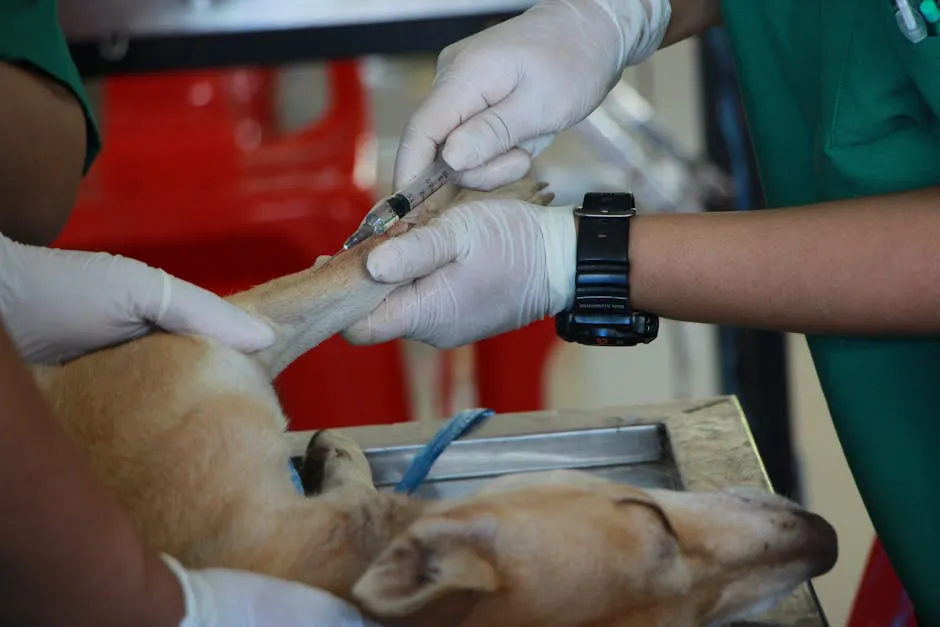
Possible Side Effects
Side Effects of Melatonin
While melatonin is generally safe for dogs, it’s important to watch for potential side effects. Some dogs may experience:
- Drowsiness or lethargy
- Upset stomach or nausea
- Increased heart rate
- Confusion or disorientation
These side effects are usually mild. However, monitoring your dog for any unusual behavior is crucial. If you notice any adverse reactions, contact your veterinarian immediately. They can provide guidance on whether to continue or adjust the dosage.
It’s always best to err on the side of caution. If your dog is on other medications or has underlying health issues, discuss these factors with your vet. They can help ensure your dog’s safety while using melatonin as a supplement.

Drug Interactions
Interactions with Other Medications
When considering melatonin for dogs, it’s crucial to be aware of potential drug interactions. Some medications may interfere with melatonin’s effects. For instance, blood thinners like warfarin may increase bleeding risks when combined with melatonin. Sedatives and tranquilizers can also have their effects amplified, leading to excessive drowsiness and lethargy.
Additionally, melatonin can alter the efficacy of certain medications, such as corticosteroids or immunosuppressive drugs. This interaction could hinder their intended effects, complicating treatment plans. Always inform your veterinarian about all medications your dog is currently taking. This includes prescription drugs, over-the-counter medications, and any supplements. Your vet can provide guidance on how to safely incorporate melatonin into your dog’s routine while minimizing risks. By prioritizing medication safety, you can ensure your dog’s health and well-being.
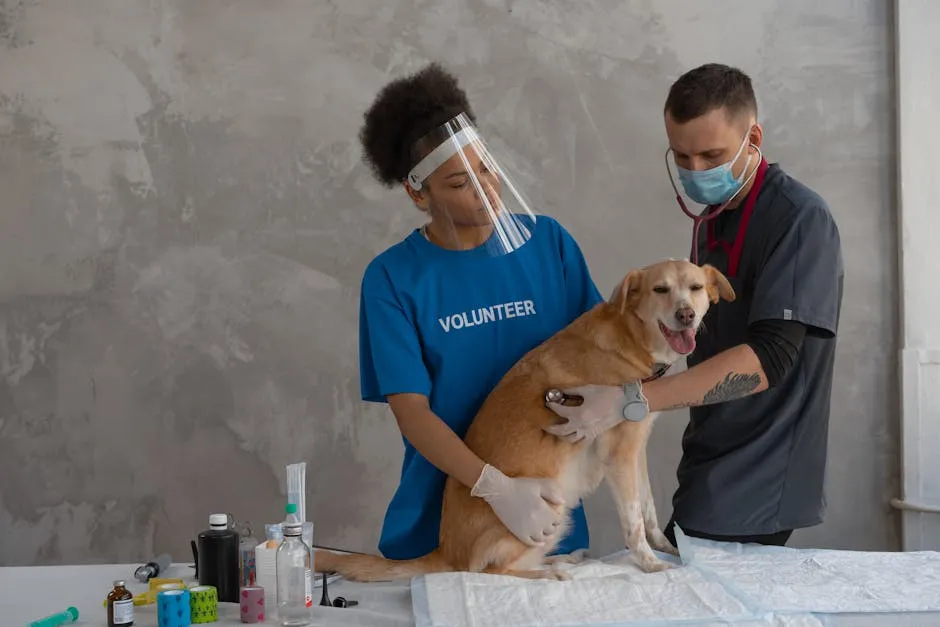
FAQs about Melatonin for Dogs
Can I give my dog melatonin for anxiety?
Yes, melatonin can help reduce anxiety in dogs. Many pet owners use it during stressful situations like thunderstorms or fireworks. Administering it 30 minutes to an hour before the event often yields the best results.
How much melatonin can I give my dog?
Dosage varies based on your dog’s weight and condition. Generally, small dogs might need 0.5 – 1.5 mg, while larger breeds could require 3 – 5 mg. Always consult your vet for precise recommendations tailored to your pet.
Will melatonin help my dog sleep better?
Melatonin can assist dogs suffering from sleep issues, especially older dogs. It helps regulate their sleep-wake cycles, promoting better rest. Most dogs respond well, often falling asleep more easily.
Can dogs overdose on melatonin?
While serious overdoses are rare, they can occur. Symptoms may include vomiting, drowsiness, or diarrhea. If you suspect an overdose, contact your veterinarian immediately for advice.
Is melatonin safe for puppies?
It’s best to avoid giving melatonin to puppies unless advised by your vet. Puppies are still developing, and melatonin might interfere with their growth and hormonal balance. Always prioritize their safety and consult a professional.

Conclusion
In summary, melatonin can be a helpful supplement for dogs. It offers benefits like anxiety reduction, improved sleep quality, and assistance with certain health conditions. However, it’s essential to use it safely. Always consult your veterinarian before starting any supplement, including melatonin. They can provide guidance on the appropriate dosage and potential interactions with other medications.
Responsible pet ownership means making informed decisions about your dog’s health. Prioritize your dog’s well-being by seeking professional advice. This ensures the best care and effective treatment options for your furry friend.

Additional Resources
For further reading on melatonin and dog health, consider exploring these reputable sources:
- PetMD: Melatonin for Dogs
- American Kennel Club: Melatonin Uses
- Veterinary Centers of America: Melatonin
For your dog’s overall health, consider a Pet First Aid Kit for emergencies. It’s always good to be prepared for the unexpected!
Please let us know what you think about our content by leaving a comment down below!
Thank you for reading till here 🙂
For more information on how melatonin can benefit your dog, check out this article on melatonin for dogs.
Also, if your dog enjoys a good challenge, they might love an Interactive Dog Toy. These toys stimulate their minds and keep them engaged, making playtime even more fun!
And let’s not forget about grooming! A Dog Grooming Kit can make bath time a breeze and keep your pup looking their best!
Finally, remember that hydration is key! A Dog Water Bottle is perfect for keeping your furry friend hydrated during walks or trips to the park!
All images from Pexels

